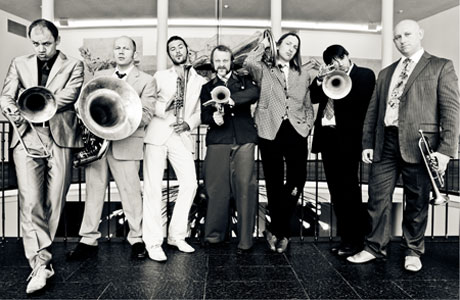
Meet the lads...
It’s impossible to try and musically categorise Mnozil Brass.
They are truly unique.
However, there is one thing that their legions of fans all agree on: Once you have seen the zany Austrians live, you will never forget them.
Austria might not be a nation known throughout the world for its wit and natural hilarity, but part of Mnozil’s curious appeal is that they break the mould of wordless comedy.
Comedic brilliance
Thomas Gansch, Robert Rother, Roman Rindberger, Leonard Paul, Gerhard Füssl, Zoltan Kiss and Wilfried Brandstötter delight in a brand of comedic brilliance that for all its slapstick fun is also beautifully observed and delivered with flamboyant panache and forensic attention to detail.
One suspects that legends spanning the generations, from Laurel and Hardy to Harry Hill, would appreciate the finer points of the Austrian’s own, very particular brand of humour.
Yet Mnozil are first and foremost, world class musicians.
Virtuoso
These seven virtuoso players traverse a bewildering variety of musical styles and genres, producing a sound that can replicate anything from a full-scale brass band to the tenderness and a silken beauty of a string quartet.
The sheer variety and diversity of their shows has now been wowing audiences the world over for nearly two decades, and as the ensemble gets back to work with the preparation of a new show after a three month summer break, 4BR’s Chris Thomas chatted to Wilfried Brandstötter and Gerhard Füssl about the ensemble’s past, present and future.
Chris Thomas: Many people are still curious about the beginnings of Mnozil and where your name comes from.
Could you tell us something of the origins of the ensemble?
Wilfried Brandstötter: Most of us started our studies at the University of Music and Fine Arts in Vienna. We came from different parts of Austria but we had all met socially and played together in various wind bands.
In front of the university there was a pub called ‘Joseph Mnozil´s Inn’ which was run by a certain Mr. Mnozil and his wife.
Once a month there was a so-called ‘Musikantenstammtisch’, which was essentially a big jam session. Anybody could bring an instrument and take part in it and so did we.
We found that we had a common repertoire of polkas and marches which we all shared and which we did not have to rehearse.
At the very beginning we simply played in the pub for free drinks but after a while we started playing at weddings, funerals, christenings, street markets and that kind of stuff.
We had a pool of musicians and whoever had time would play.
Sometimes we had 2 trumpets, a trombone and a tuba but on another day we might have one trumpet, one button box, a harp, a trombone and so on.
After a while we ended up with a quintet of two trumpets, two trombones and a tuba consisting of Thomas, Wolfgang, Sebastian, Gerhard and myself and after three or four years Robert joined us on trumpet along with Leonhard on trombone and bass trumpet.
Since then we haven´t changed the line up. When Wolfgang left about 8 years ago Roman came in and Zoltan replaced Sebastian who is now working as an opera singer.
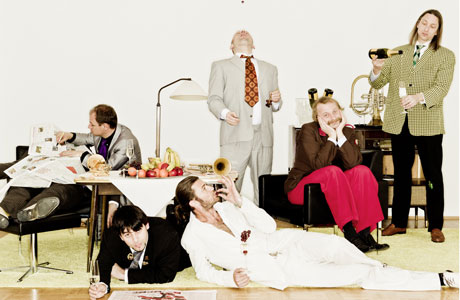
Chris Thomas: Where did each of you play professionally and what were your musical careers before Mnozil became a part of your lives?
Wilfried Brandstötter: Almost everybody subbed in the Vienna State Opera and other Viennese orchestras.
Thomas played in the Vienna Art Orchestra and many jazz bands, Leonhard and Thomas played in the Salonorchestra Alhambra with Leonhard also playing in the Concentus Musicus Wien.
Roman was solo trumpet at the Wiesbaden State Opera, Gerhard played in the Camerata Academica Salzburg, Zoltan played in the Radio Symphony Orchestra of Katowice in Poland and I played in the Klangforum Wien as well as in the Tonkünstlerorchestra.
Besides that everybody played in various other bands covering folk music, jazz, funk and classical music.
Gerhard Füssl: Each of us already had a more or less full time job. For example, I worked in a Music School in Salzburg and was Music School Director for some years.
Bit by bit however, the commitments of Mnozil increased so the eventual decision to quit our day jobs was just a logical consequence of that increasing commitment.
Chris Thomas: As an ensemble you spend a huge amount of time together travelling and performing.
You must have to get on well with each other to spend so much time in each other’s company?
Wilfried Brandstötter: It’s like a marriage really and has its ups and downs along the way, but in fact we get along surprisingly well after all of these years and because there are seven of us the alliances are always changing.
Gerhard Füssl: Well, the fact is that after all these years we know each other very well; our personalities, mentalities, each other’s private parts and so on!!
I think it is very important to respect each other’s qualities and temporal problems.
Chris Thomas: How long does it usually take to put together and rehearse a new show?
Wilfried Brandstötter: About one year from its conception and between three and six months to rehearse and learn it.
Gerhard Füssl: It depends on the character of the show.
We have performed two shows, 'The Trojan Boat' and 'Irmingard', that were along the lines of operas and complete with operatic parts which meant that we sang as soloists and within choruses, performed like dancers (or at least as close to dancing as we could get; either way it was pretty funny, especially for the audience!) and last but not least, we also had our usual instrumental parts to do.
It goes without saying that we had to rehearse a lot for the 'Trojan Boat' and 'Irmingard'.
It was at least half a year of concentrated rehearsal although for the other shows it’s less.
Rehearsing for a new show is a process of getting more and more intensive until the premiere. Some of us also compose the music and at the very outset we rehearse it before we learn it by heart.
The next and final step is to combine all of the various strands with the choreography to form a complete show.
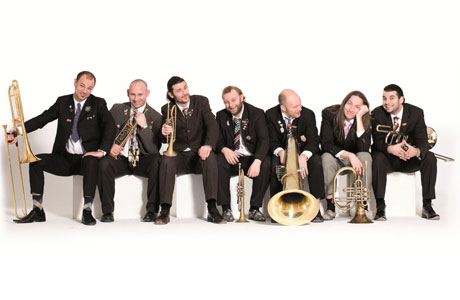
Chris Thomas: Do you think carefully about the structure, continuity and balance of the show as well as its musical content?
Wilfried Brandstötter: We have done about ten different shows so far and have therefore developed a pretty good sense of how a show should work.
In reality however you never know before the premiere if the audience is going to like it or not.
Gerhard Füssl: Yes, I think this is a very necessary point for a successful show.
We always try to pay very carefully attention to how we create tensions within the whole show and why.
Every good story has its rules on how to start, how it should develop and how to present the characters and so on.
We also think a good deal about the show’s continuity; we really want to keep people awake!
We have occasionally made changes to parts of some shows as a result of audience reactions.
Chris Thomas: When at home in Austria do you have a regular rehearsal schedule or are rehearsals normally done on the road?
Wilfried Brandstötter: No, we do not rehearse regularly.
When we work on a new show we rehearse as much as we can, whether on tour or at home.
When a show is running we try to have ten or fifteen minutes every night before we walk on stage and talk about what went wrong the night before to try and polish it.
Gerhard Füssl: When a new show is on the way we arrange a very strict timetable to work on it, which is normally planned a long way in advance.
For me, living in Salzburg, that means getting my lazy body all the way to Vienna and that’s in addition to all the concerts that are taking part between the rehearsals.
It all means long periods of not being at home.
Chris Thomas: The incredible sound that Mnozil makes is one of your trademarks.
Is the timbre and sheer scale of the sound something that you have consciously worked on and engineered?
Wilfried Brandstötter: No, I suppose not.
I think this happened naturally over the years.
We always play unplugged and because we play big venues we have had to develop good projection automatically. It’s great fun using the whole scale of volume from a ppp to a fff.
And we have the advantage that no conductor has ever told us that we play to loud.
We just do it and enjoy it!
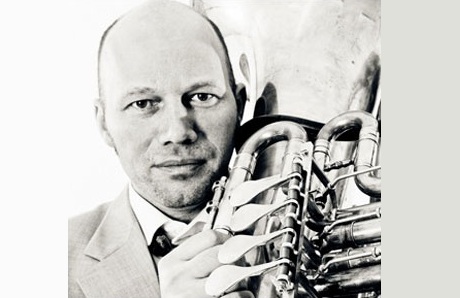
Chris Thomas: British audiences have a clear affinity with the comedy side of your shows as well as the music.
Where do you find your inspiration for the comedic elements of your act and who do you feel that your influences are in this respect?
Wilfried Brandstötter: Life sometimes is full of comedy; you just have to watch it carefully.
There are so many funny things happening in daily life that we simply have to find a way of bringing it onto the stage.
Our heroes are Spike Jones, Victor Borge, Buster Keaton, Stan and Ollie and all of the other great comedians the world has seen so far.
Chris Thomas: And similarly, who do you see as your musical influences and icons?
Wilfried Brandstötter: Most of the classical composers, many jazz players and singers and all of the guys who write or perform any kind of good music.
Chris Thomas: All of the Mnozil members have an individual and specific “style” in terms of both personality and fashion.
How have you deliberately arrived at this or has it evolved naturally?
Wilfried Brandstötter: This also wasn’t planned. For most shows we collaborate with a director or a choreographer.
We have found that it’s good for the structure of a show if everybody has a certain character on stage. This enables you to offer a broad variety of pictures and scenes.
If everybody is doing the same it gets boring pretty quickly.
Chris Thomas: You have become very popular in Japan in recent years.
Do you find that your humour, which is largely without use of the spoken word, transcends cultural boundaries and do you ever consider this when putting together new material?
Wilfried Brandstötter: It definitely helps that we create our shows almost entirely non-verbally but with a lot of comedy.
People love to be entertained whether it’s in Europe, Asia or America and we have found no difference in the reception.
In fact we did 96 concerts in 15 different countries in 2011.
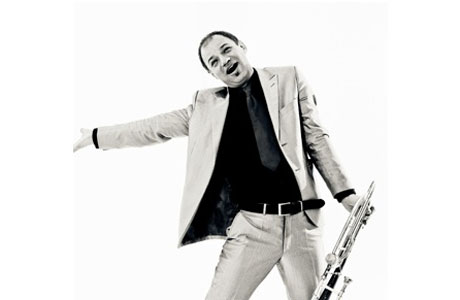
Chris Thomas: The variety of your shows, from projects such as The Trojan Boat to Almrausch, is quite staggering.
As time goes by does it become more difficult to find new inspiration musically and humorously?
Wilfried Brandstötter: It´s always a huge amount of work to create a completely new show and of course, there is some pressure involved because people have high expectations of our group, but that’s how it is.
When we are working on new material we don’t think too much about the audience.
As long as we have fun and a good feeling during the rehearsals we can be almost certain that people will like it.
Chris Thomas: How do you tend to begin with new arrangements and material?
Although Thomas and Leonhard are prolific in this respect is there any degree of collaboration involved?
Wilfried Brandstötter: There are different ways of creating our music.
Some pieces are written or arranged by Leonhard, Thomas or Gerhard and we simply learn them by heart.
For other pieces, like 'Bohemian Rhapsody' for instance, we used a piano reduction and listened to the original many, many times and then figured out the voicings and the singing.
Then certain other pieces, such as the 'Overture to The Trojan Boat', are composed by all of us during rehearsals.
We simply stand together and improvise around a melody.
Chris Thomas: Mnozil Brass play exclusively on Schagerl instruments.
Could you tell us how your relationship with Karl Schagerl came about and what your links with Schagerl mean to the ensemble?
Wilfried Brandstötter: The connection with Schagerl is a very old one.
Thomas and Robert grew up in Melk and the Schagerl factory is in Mank, which is only about 15 miles away.
Thomas’s father and Mr. Schagerl senior were friends so we did not really have to find each other.
It’s wonderful to co-operate with them and it makes life easier for us.
We bring in our own ideas, whether it’s to do with the sound or the design, and the Schagerl’s are very supportive in working them out.
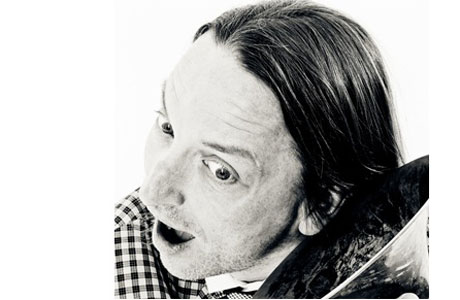
Chris Thomas: And this has now grown into the development of your own line of instrumental designs?
Wilfried Brandstötter: Yes, the logical step after playing their instruments for so many years.
Chris Thomas: Your schedule of concerts and tours is a hectic one but this year you have managed to take an extended three-month break.
Is this the first time you have been able to do this and was it beneficial?
Wilfried Brandstötter: Well, the benefit was that we were able to spend a long time with our families, take real holidays and enjoy the summer!
Gerhard Füssl: The reason for this long break was really a result of working too hard in the year 2008.
During that period we performed a lot of concerts and undertook many with the rehearsals for Irmingard, along with CD productions and so on and so on.
The result was a lack of motivation to continue with the kind of life we were leading.
We found that we simply had no time for our own privacy and our families were unhappy with us when we could only be in contact via email, phone or Skype.
So, in autumn 2008 we decided to take a three-month break as soon as possible and although we didn’t manage to take the break until this summer, I think it showed us the necessity for the decision.
Now we feel fresh again and powerful for the next 40 years!!
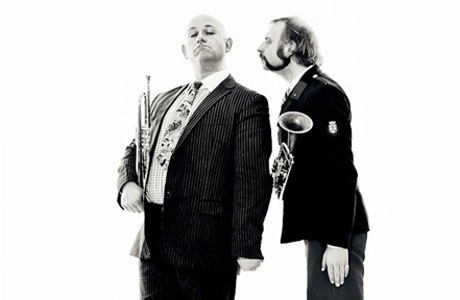
Chris Thomas: And you are now hitting the road once again for a new tour and with new material?
Wilfried Brandstötter: Yes, we created a new show called 'Blofeld' before the break and now we are touring extensively with it.
Gerhard Füssl: Actually, we are doing a Swiss tour right now, performing the new show 'Blofeld', which we are mixing up with Mnozil, plays Mnozil.
Chris Thomas: Brass bands have made substantial moves forward in Austria recently largely as a result of Hannes Buchegger and his Brass Band Oberösterreich and Austrian Youth Brass Band along with composers such as Thomas Doss.
Have you yet seen any benefit from these cultural changes amongst brass players in your native country and do you see the possibility of further development in the future?
Wilfried Brandstötter: Of course!
Playing in a brass band helps and motivates young players very much.
They have to work on their technique and their versatility.
The work Hannes has done through the last years cannot be praised highly enough!
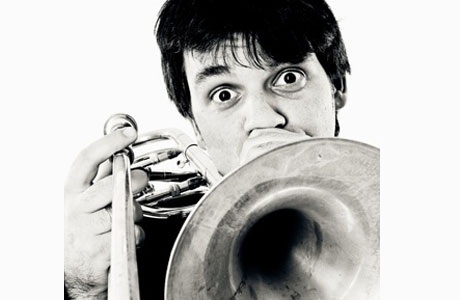
Chris Thomas: Finally, 2012 will be Mnozil’s 20th birthday. Do you have any special celebrations and shows planned?
Wilfried Brandstötter: Absolutely!
We will be undertaking a jubilee tour, playing three concerts in a row in the Vienna Konzerthaus and we are also planning to make a portrait or a film with the Austrian Broadcast Company ORF. This will all happen in 2013.
In 1992 we had our first sessions at the Mnozil Inn but our very first gig outside the pub was in January 1993.
So the official birthday is in 2013.
Chris Thomas: We will all be looking forward to your celebrations immensely!
Thanks for talking to us.













